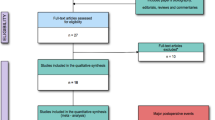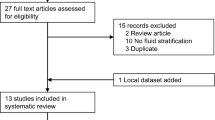Abstract
Purpose
This study compared perioperative restrictive fluid therapy to liberal (conventional) fluid therapy in patients undergoing major abdominal surgery and investigated the rate of post-operative morbidity (complication rates), recovery (time to flatus), and the length of hospital stay.
Methods
The Medline, PubMed, Cochrane, and EMBASE databases were searched until June 18, 2015. Randomized controlled trials, two-arm prospective studies, and retrospective studies were included in our analyses. A sensitivity analysis, publication bias assessment, and quality assessment were performed.
Results
The effects of the two therapies were similar in the subgroup analysis of patients who underwent hepato-gastroenterological surgery (P = 0.287). However, in a subgroup of patients who underwent vascular abdominal surgery, the restricted fluid treatment regimen was associated with a lower risk of complications in comparison with the conventional regimen (pooled OR = 0.12, 95 % CI 0.03–0.47, P = 0.002). There was no difference between the two regimens with respect to the incidence of cardiopulmonary complications (P = 0.733). However, the patients who received the restricted fluid treatment regimen had a shorter time to flatus (P = 0.031) and a shorter hospital stay (P = 0.033) than the patients who received the conventional regimen.
Conclusions
Restrictive fluid therapy and liberal conventional therapy were associated with similar rates of overall and cardiopulmonary complications; however, restrictive fluid therapy was associated with a more rapid recovery and a shorter length of hospital stay.





Similar content being viewed by others
References
Bleier JI, Aarons CB. Perioperative fluid restriction. Clin Colon Rectal Surg. 2013;26:197–202.
Cohn SM, Pearl RG, Acosta SM, Nowlin MU, Hernandez A, Guta C, et al. A prospective randomized pilot study of near-infrared spectroscopy-directed restricted fluid therapy versus standard fluid therapy in patients undergoing elective colorectal surgery. Am Surg. 2010;76:1384–92.
Holte K, Kehlet H. Perioperative single-dose glucocorticoid administration: pathophysiologic effects and clinical implications. J Am Coll Surg. 2002;195:694–712.
Grocott MP, Mythen MG, Gan TJ. Perioperative fluid management and clinical outcomes in adults. Anesth Analg. 2005;100:1093–106.
Holte K, Kehlet H. Fluid therapy and surgical outcomes in elective surgery: a need for reassessment in fast-track surgery. J Am Coll Surg. 2006;202:971–89.
Chappell D, Jacob M, Hofmann-Kiefer K, Conzen P, Rehm M. A rational approach to perioperative fluid management. Anesthesiology. 2008;109:723–40.
Brandstrup B. Fluid therapy for the surgical patient. Best Pract Res Clin Anaesthesiol. 2006;20:265–83.
Holte K, Kehlet H. Compensatory fluid administration for preoperative dehydration–does it improve outcome? Acta Anaesthesiol Scand. 2002;46:1089–93.
Bundgaard-Nielsen M, Secher NH, Kehlet H. ‘Liberal’ vs. ‘restrictive’ perioperative fluid therapy–a critical assessment of the evidence. Acta Anaesthesiol Scand. 2009;53:843–51.
Holte K, Sharrock NE, Kehlet H. Pathophysiology and clinical implications of perioperative fluid excess. Br J Anaesth. 2002;89:622–32.
Lobo DN, Bostock KA, Neal KR, Perkins AC, Rowlands BJ, Allison SP. Effect of salt and water balance on recovery of gastrointestinal function after elective colonic resection: a randomised controlled trial. Lancet. 2002;359:1812–8.
Brandstrup B, Tonnesen H, Beier-Holgersen R, Hjortsø E, Ørding H, Lindorff-Larsen K, et al. Effects of intravenous fluid restriction on postoperative complications: comparison of two perioperative fluid regimens: a randomized assessor-blinded multicenter trial. Ann Surg. 2003;238:641–8.
Nisanevich V, Felsenstein I, Almogy G, Weissman C, Einav S, Matot I. Effect of intraoperative fluid management on outcome after intraabdominal surgery. Anesthesiology. 2005;103:25–32.
Khoo CK, Vickery CJ, Forsyth N, Vinall NS, Eyre-Brook IA. A prospective randomized controlled trial of multimodal perioperative management protocol in patients undergoing elective colorectal resection for cancer. Ann Surg. 2007;245:867–72.
Holte K, Klarskov B, Christensen DS, Lund C, Nielsen KG, Bie P, et al. Liberal versus restrictive fluid administration to improve recovery after laparoscopic cholecystectomy: a randomized, double-blind study. Ann Surg. 2004;240:892–9.
MacKay G, Fearon K, McConnachie A, Serpell MG, Molloy RG, O’Dwyer PJ. Randomized clinical trial of the effect of postoperative intravenous fluid restriction on recovery after elective colorectal surgery. Br J Surg. 2006;93:1469–74.
Kabon B, Akca O, Taguchi A, Nagele A, Jebadurai R, Arkilic CF, et al. Supplemental intravenous crystalloid administration does not reduce the risk of surgical wound infection. Anesth Analg. 2005;101:1546–53.
Holte K, Foss NB, Andersen J, Valentiner L, Lund C, Bie P, et al. Liberal or restrictive fluid administration in fast-track colonic surgery: a randomized, double-blind study. Br J Anaesth. 2007;99:500–8.
Cochrane Handbook for Systematic Reviews of Interventions Version 5.1.0 [updated March 2011]: The Cochrane Collaboration; 2011. Available from: http://www.cochrane-handbook.org.
Sweeting MJ, Sutton AJ, Lambert PC. What to add to nothing? Use and avoidance of continuity corrections in meta-analysis of sparse data. Stat Med. 2004;23:1351–75.
Hozo SP, Djulbegovic B, Hozo I. Estimating the mean and variance from the median, range, and the size of a sample. BMC Med Res Methodol. 2005;5:13.
Higgins JPT. Cochrane Collaboration Handbook for Systematic Reviews of Interventions Version 5.1.0 [updated March 2011]. The Cochrane Collaboration, 2011. Available from: http://www.cochrane-handbook.org. 2011.
Sterne JA, Sutton AJ, Ioannidis JP, Terrin N, Jones DR, Lau J, et al. Recommendations for examining and interpreting funnel plot asymmetry in meta-analyses of randomised controlled trials. BMJ. 2011;343:d4002.
Peng NH, Gao T, Chen YY, Xi FC, Zhang JJ, Li N, et al. Restricted intravenous fluid regimen reduces fluid redistribution of patients operated for abdominal malignancy. Hepatogastroenterology. 2013;60:1653–9.
Srinivasa S, Taylor MH, Singh PP, Yu TC, Soop M, Hill AG. Randomized clinical trial of goal-directed fluid therapy within an enhanced recovery protocol for elective colectomy. Br J Surg. 2013;100:66–74.
Gonzalez-Fajardo JA, Mengibar L, Brizuela JA, Castrodeza J, Vaquero-Puerta C. Effect of postoperative restrictive fluid therapy in the recovery of patients with abdominal vascular surgery. Eur J Vasc Endovasc Surg. 2009;37:538–43.
Piljic D, Petricevic M, Piljic D, Ksela J, Robic B, Klokocovnik T. Restrictive versus Standard Fluid Regimen in Elective Minilaparotomy Abdominal Aortic Repair-Prospective Randomized Controlled Trial. Thorac Cardiovasc Surg 2015.
McArdle GT, McAuley DF, McKinley A, Blair P, Hoper M, Harkin DW. Preliminary results of a prospective randomized trial of restrictive versus standard fluid regime in elective open abdominal aortic aneurysm repair. Ann Surg. 2009;250:28–34.
Futier E, Constantin JM, Petit A, Chanques G, Kwiatkowski F, Flamein R, et al. Conservative vs restrictive individualized goal-directed fluid replacement strategy in major abdominal surgery: a prospective randomized trial. Arch Surg. 2010;145:1193–200.
Abraham-Nordling M, Hjern F, Pollack J, Prytz M, Borg T, Kressner U. Randomized clinical trial of fluid restriction in colorectal surgery. Br J Surg. 2012;99:186–91.
Doherty M, Buggy DJ. Intraoperative fluids: how much is too much? Br J Anaesth. 2012;109:69–79.
Gao T, Li N, Zhang JJ, Xi FC, Chen QY, Zhu WM, et al. Restricted intravenous fluid regimen reduces the rate of postoperative complications and alters immunological activity of elderly patients operated for abdominal cancer: a randomized prospective clinical trail. World J Surg. 2012;36:993–1002.
Arkilic CF, Taguchi A, Sharma N, Ratnaraj J, Sessler DI, Read TE, et al. Supplemental perioperative fluid administration increases tissue oxygen pressure. Surgery. 2003;133:49–55.
Bamboat ZM, Bordeianou L. Perioperative fluid management. Clin Colon Rectal Surg. 2009;22:28–33.
Burdett E, Dushianthan A, Bennett-Guerrero E, Cro S, Gan TJ, Grocott MP, et al. Perioperative buffered versus non-buffered fluid administration for surgery in adults. Cochrane Database Syst Rev 2012;12:CD004089.
Hamakawa T, Kurokawa Y, Mikami J, Miyazaki Y, Takahashi T, Yamasaki M, et al. Risk factors for postoperative complications after gastrectomy in gastric cancer patients with comorbidities. Surg Today. 2016;46(2):224–8.
Katayama H, Kurokawa Y, Nakamura K, Ito H, Kanemitsu Y, Masuda N, et al. Extended Clavien-Dindo classification of surgical complications: Japan Clinical Oncology Group postoperative complications criteria. Surg Today. 2016;46(6):668–85.
Acknowledgments
We thank Professor Xiu-Min Ma, from the clinical laboratory department, 1st affiliated hospital of Xinjiang Medical University, for her valuable suggestions regarding the data analysis and draft preparation process.
Author information
Authors and Affiliations
Corresponding author
Ethics declarations
Conflict of interest
The authors declare no conflicts of interest in association with this study.
Funding
This work is supported by the National Natural Science Foundation (No. 81360082).
Additional information
Feng-Ju Jia and Qiao-Yuan Yan contributed to this work equally.
Rights and permissions
About this article
Cite this article
Jia, FJ., Yan, QY., Sun, Q. et al. Liberal versus restrictive fluid management in abdominal surgery: a meta-analysis. Surg Today 47, 344–356 (2017). https://doi.org/10.1007/s00595-016-1393-6
Received:
Accepted:
Published:
Issue Date:
DOI: https://doi.org/10.1007/s00595-016-1393-6




